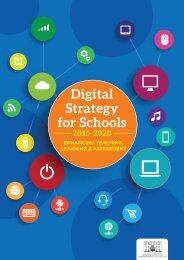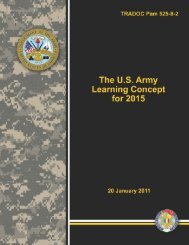Digital Strategy for Schools
TKmc0
TKmc0
Create successful ePaper yourself
Turn your PDF publications into a flip-book with our unique Google optimized e-Paper software.
DIGITAL STRATEGY FOR SCHOOLS – ENHANCING TEACHING, LEARNING & ASSESSMENT<br />
Learning <strong>for</strong> life: we want an education and training system that provides all learners with the<br />
knowledge and skills they need to participate fully in society and the economy, one that enables<br />
learners to learn how to learn. (Ibid; p.4)<br />
The <strong>Strategy</strong> recognises that the existence of a pedagogical orientation that supports an active use of<br />
technology by teachers and students in schools increases the likelihood of ICT being used effectively<br />
in teaching and learning. The <strong>Strategy</strong> will provide that any new and/or revised curricula, syllabi and<br />
teacher guidelines will include clear statements regarding why and how digital technology should<br />
be used in teaching and learning, particularly in relation to components of the literacy and numeracy<br />
strategy, and across all subjects and areas of learning.<br />
PLANNING FOR THE EFFECTIVE USE OF ICT IN SCHOOLS<br />
During the public consultation phase, many submissions acknowledged that schools need to plan<br />
<strong>for</strong> the effective use of ICT as part of their whole-school planning activities.<br />
Currently, in planning how to use ICT in teaching, learning and assessment activities many schools<br />
use the Planning and Implementing e-Learning in Your School Handbook (NCTE, 2009) 26 . This<br />
includes the e-Learning Roadmap, a planning tool designed to help schools identify where they<br />
currently are in relation to e-Learning, and where they would like to go.<br />
Feedback from schools indicates that this handbook is beneficial in helping schools to plan,<br />
but needs to be updated to complement the School Self-Evaluation (SSE) process 27 . SSE is a<br />
collaborative, reflective process of internal school review. It provides teachers with a means of<br />
systematically looking at how they teach and how pupils learn and helps schools and teachers to<br />
improve outcomes <strong>for</strong> learners. The handbook will guide schools into taking ownership of their own<br />
development and improvement.<br />
DIGITAL LITERACY IN THE CURRICULUM<br />
While the concept of ‘ICT integration’ is at the core of the <strong>Strategy</strong>, the concept of developing ‘discrete’<br />
ICT skills also needs to be explored. Submissions called <strong>for</strong> the development of students’ digital<br />
literacy by including coding and programming in the Irish primary and post-primary curriculum so<br />
that every learner has an opportunity to learn skills such as computational thinking, logic, critical<br />
thinking and strategic thinking to solve problems.<br />
The term digital literacy is complex and often contested. The NCCA’s short course on <strong>Digital</strong> Media<br />
Literacy 28 explains digital literacy as follows:<br />
In studying digital media, students learn to use digital technology, communication tools and the<br />
internet to engage in self-directed enquiry. As students develop their digital literacy skills, they<br />
improve their capacity to know what they are looking <strong>for</strong>, what in<strong>for</strong>mation to ignore or discard,<br />
and how to identify what can be useful or significant. They learn to discriminate between the<br />
multiple sources of in<strong>for</strong>mation available online and to challenge the views they find there. They<br />
learn how to create, collaborate and communicate effectively and ethically. (Ibid, p. 6)<br />
22<br />
26<br />
The e-Learning Handbook (http://www.pdsttechnologyineducation.ie/en/Planning/e-Learning-Handbook/The-e-Learning-Handbook.html)<br />
27<br />
School Self Evaluation (http://www.schoolself-evaluation.ie/)<br />
28<br />
<strong>Digital</strong> Media Literacy Short Course (http://www.juniorcycle.ie/NCCA_JuniorCycle/media/NCCA/Documents/Curriculum/Short%20Courses/<br />
<strong>Digital</strong>-Media-Literacy-Final.pdf)




